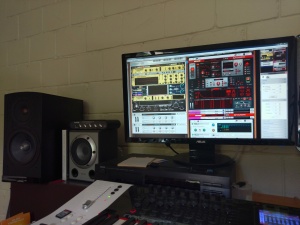Years ago I wrote a series of articles on making your record and getting it out there, along with a host of supporting articles covering things you will probably encounter – all in the Tutorial section.
A big thing I always try to focus on is the “Why”. If you know why things are done a certain way or why a particular course of action was chosen you are better equipped to make similar choices yourself not only now but in the future. This is the old Biblical parable of giving fish vs teaching to fish. I like to teach to fish as that raises us all.
 I have come to understand that many people prefer a more “supported” or “structured” process than just a collection of articles on how to think about things with no particular actions to take. Now the “how to” is always very situational so it is not possible (or sensible) to say do this exact thing and you’ll be huge but if I can walk you through a process, a little like you were getting Artist Development & Production work, that may help you to either;
I have come to understand that many people prefer a more “supported” or “structured” process than just a collection of articles on how to think about things with no particular actions to take. Now the “how to” is always very situational so it is not possible (or sensible) to say do this exact thing and you’ll be huge but if I can walk you through a process, a little like you were getting Artist Development & Production work, that may help you to either;
- a) get it done yourself or,
- b) understand the sorts of things you pay your Producer for.
This page won’t cover much but be the intro to the course.
I will strongly advise you take this course in order as the idea is that each article and exercise leads to the next. Jumping around may make this a lot harder (not to mention more frustrating). On the subject of frustration, you will meet it. Again and again. What you do then will have a huge impact on your outcome (success & happiness).
- Soundcloud, YouTube, Landr – Why Web Band Apps are doing you more damage than good and What You Can Do Instead
- Lesson 1: Who Are You & What Is Your Message?
- Lesson 2: Making the Pitch
- Lesson 3: Developing Skill & Creativity
- Lesson 4: Revisiting Your Instrument
- Lesson 5: Sacrificing Your Ego To The Song
- Lesson 6: Letting The Song Lead
- Lesson 7: The Art of Finishing or Finishing the Art
- Lesson 8: Answering The Call
- Lesson 9: Bringing It All Together
- Lesson 10: Interview with Iron Will
No matter when you meet this course, please feel free to participate actively in the Homework & Action sections at the bottom of each page. Even if this article is old, I am still listening.
It is common for people to want references to prove the author’s assertions. Sadly as a service professional, it is not always so easy, we learn from everything we do, see and hear – incl. our mistakes and those of others. We pick up from places that don’t always have ISBNs or web addresses. Here are a few things that may help you:
- As I write this I am watching Friday On My Mind which is about The Easybeats, the first Oz Rock band who became the guys who drove most of the acts that followed either with inspiration or directly as Alberts and Harry Vanda & George Young tutored band after band into success – most notably AC/DC, The Angels & Rose Tattoo. The show takes the usual liberties with some details but there are clear lessons as the guys have to transition from i) lads strumming to ii) a band with a unique story and then iii) the discipline of studio work, iv) getting past the first flush of success and The Dip; v) then they meet the Producer and have to step up again.
- Rock Star – with Mark Wahlberg. I have referenced this a few times as there is a lot of stuff in here. Sure there are a few silly things, like the limp Grunge ending but the times the band members talk about how the music game works are super. And the song & stage parts are great.
- Eddie & The Cruisers II Eddie Lives – the original was a sleeper till it suddenly awoke as a cult movie. The sequel took a long time to happen and everyone lost interest which is a shame as it is not a bad movie for music fans and wonderful for aspiring musos for reminders not to let perfection get in the way and also to play from passion instead of an overwhelming swarm of notes.
- Jersey Boys – apart from being a very well made movie, it shows the jostling of personalities, the courage and staying power required to make it (and stay there) as well as the synergies created when the right partnerships are created (esp Frankie & Barry).
Seth Godin just sent me this:
Don’t hide your work
Offer help
Ask for help
Tell the truth
Upgrade your tools
Don’t hide your mistakes
Add energy, don’t subtract it
Share
If you’re not proud of it, don’t ship it
Know the rules of your craft
Break the rules of your craft with intention
Make big promises
Keep them
Add positivity
Let others run, ever faster
Take responsibility
Learn something new
Offer credit
Criticize the work, not the artist
Power isn’t as important as productivity
Honor the schedule
You are not your work, embrace criticism
Go faster
Sign your work
Walk lightly
Change something
Obsess about appropriate quality, ignore perfectionA studio isn’t a factory. It’s when peers come together to do creative work, to amplify each other and to make change happen. That can happen in any organization, but it takes commitment.

Appears to be a very useful tutorial, looking forward to following the series, thanks for this.